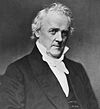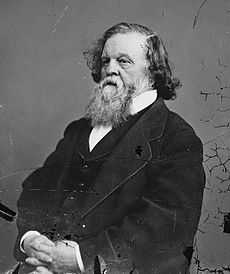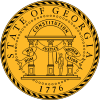- Howell Cobb
-
For other uses, see Howell Cobb (disambiguation).
Howell Cobb 
23rd Speaker of the United States House of Representatives In office
December 22, 1849 – March 4, 1851President Zachary Taylor
Millard FillmorePreceded by Robert C. Winthrop Succeeded by Linn Boyd 2nd Speaker of the Provisional Confederate Congress
Also a Provisional Head of StateIn office
February 4, 1861 – February 17, 1862
Head of State until February 18, 1861Preceded by Robert W. Barnwell Succeeded by Thomas Stanley Bocock (Speaker)
Jefferson Davis (Head of State)Member of U.S. House of Representatives
from Georgia's At-large districtIn office
March 4, 1843 – March 3, 1845Preceded by Julius C. Alford, Edward J. Black, Walter T. Colquitt, Thomas F. Foster, Roger L. Gamble, George W. Crawford, Thomas B. King, James A. Meriwether, Mark A. Cooper, Lott Warren (General ticket) Succeeded by None; Representatives subsequently elected by district Member of U.S. House of Representatives
from Georgia's 6th districtIn office
March 4, 1845 – March 4, 1851Preceded by None; first elected Succeeded by Junius Hillyer 40th Governor of Georgia In office
November 5, 1851 – November 9, 1853Preceded by George W. Towns Succeeded by Herschel V. Johnson 22nd United States Secretary of the Treasury In office
March 7, 1857 – December 8, 1860President James Buchanan Preceded by James Guthrie Succeeded by Philip F. Thomas Personal details Born September 7, 1815
Jefferson County, GeorgiaDied October 9, 1868 (aged 53)
New York City, New YorkPolitical party Democratic Alma mater University of Georgia Profession Law Military service Service/branch Confederate States Army Rank Major General Unit Army of Northern Virginia
District of Georgia and FloridaBattles/wars American Civil War (Thomas) Howell Cobb (September 7, 1815 – October 9, 1868) was an American political figure. A Southern Democrat, Cobb was a five-term member of the United States House of Representatives and Speaker of the House from 1849 to 1851. He also served as a Secretary of Treasury under President James Buchanan (1857–1860) and the 40th Governor of Georgia (1851–1853).
He is, however, probably best known as one of the founders of the Confederate States of America, having served as the President of the Provisional Confederate Congress, when delegates of the secessionist states issued creation of the Confederacy.
Cobb served for two weeks between the foundation of the Confederacy and the election of Jefferson Davis as first President. This made him, as the Speaker of the Congress, provisional Head of State at this time.
Contents
Early life and career
Born in Jefferson County, Georgia, Cobb was raised in Athens, Georgia, and attended the University of Georgia where he was a member of the Phi Kappa Literary Society. He was admitted to the bar in 1836 and became solicitor general of the western judicial circuit of Georgia.
He married Mary Ann Lamar on May 26, 1835. They would have eleven children, the first in 1838 and the last in 1861. Several did not survive out of childhood, including their last, a son who was named after Howell's brother, Thomas Reade Rootes Cobb.
Congressman
He was elected as Democrat to the 28th, 29th, 30th and 31st Congresses. He was chairman of the U.S. House Committee on Mileage during the 28th Congress, and Speaker of the United States House of Representatives during the 31st Congress.
He sided with President Andrew Jackson on the question of nullification; was an efficient supporter of President James K. Polk's administration during the Mexican-American War; and was an ardent advocate of slavery extension into the territories, but when the Compromise of 1850 had been agreed upon, he became its staunch supporter as a Union Democrat. He joined Georgia Whigs Alexander Stephens and Robert Toombs in a statewide campaign to elect delegates to a state convention that overwhelmingly affirmed, in the Georgia Platform, that the state accepted the Compromise as the final resolution to the outstanding slavery issues. On that issue, Cobb was elected governor of Georgia by a large majority.
Speaker of the House
In 1850, as Speaker he would have been next in line to the Presidency for two days due to Vice Presidential vacancy and a president pro tempore not being appointed yet, except he did not meet the minimum eligibility for the presidency of being 35 years old. When Zachary Taylor died on July 9, Vice President Millard Fillmore became President. The president pro tempore of the Senate was not appointed until July 11 when William Rufus de Vane King took that position.
 President Buchanan and his Cabinet
President Buchanan and his Cabinet
From left to right: Jacob Thompson, Lewis Cass, John B. Floyd, James Buchanan, Howell Cobb, Isaac Toucey, Joseph Holt and Jeremiah S. Black, (c. 1859)Governor of Georgia
In 1851, he left the House to serve as the Governor of Georgia, holding that post until 1853. He published A Scriptural Examination of the Institution of Slavery (1856).[1]
Return to Congress and Secretary of the Treasury
He was elected to the 34th Congress and then took the position of Secretary of the Treasury in Buchanan's Cabinet. He served for three years, resigning in December 1860. At one time, Cobb was Buchanan's choice for his successor.[2]
A Founder of the Confederacy
In 1860, Cobb ceased to be a Unionist, and became a leader of the secession movement. He was president of a convention of the seceded states that assembled in Montgomery, Alabama, on February 24, 1861. Under Cobb's guidance, the delegates drafted a constitution for the new Confederacy. He served as President of several sessions of the Confederate Provisional Congress, before resigning to join the military when war erupted.
Civil War
Cobb enlisted in the Confederate Army and was named as colonel of the 16th Georgia Infantry. He was appointed a brigadier general on February 13, 1862, and assigned command of a brigade in what became the Army of Northern Virginia. Between February and June 1862, he represented the Confederate authorities in negotiations with Union officers for an agreement on the exchange of prisoners of war. His efforts in these discussions contributed to the Dix-Hill Cartel accord reached in July 1862.[3]
Cobb saw combat during the Peninsula Campaign and the Seven Days Battles. Cobb's brigade played a key role in the fighting at Crampton's Gap during the Battle of South Mountain, where it arrived at a critical time to delay a Union advance through the gap. His men also fought at the subsequent Battle of Antietam.
In October 1862, Cobb was detached from the Army of Northern Virginia and sent to the District of Middle Florida. He was promoted to major general on September 9, 1863, and placed in command of the District of Georgia and Florida. He suggested the construction of a prisoner-of-war camp in southern Georgia, a location thought to be safe from Union invaders. This idea led to the creation of Andersonville prison. When William T. Sherman's armies entered Georgia during the 1864 Atlanta Campaign and subsequent March to the Sea, General Cobb commanded the Georgia reserve corps. In the spring of 1865, with the Confederacy clearly waning, he and his troops were sent to Columbus, Georgia to help oppose Wilson's Raid. He led the hopeless Confederate resistance in the Battle of Columbus, Georgia on Easter Sunday, April 16, 1865.
During Sherman's March to the Sea, the army camped one night near Cobb's plantation. When Sherman discovered that the house he planned to stay in for the night belonged to Cobb, whom Sherman described in his Memoirs as "one of the leading rebels of the South, then a general in the Southern army," he confiscated Cobb's property and leveled the plantation, instructing his subordinates to "spare nothing."[4]
In the closing days of the war, Cobb fruitlessly opposed General Robert E. Lee's eleventh hour proposal of enlisting slaves into the army. Fearing this move would completely discredit the fundamental justification of slavery that blacks were inferior people, he said, "You cannot make soldiers of slaves, or slaves of soldiers. The day you make a soldier of them is the beginning of the end of the Revolution. And if slaves seem good soldiers, then our whole theory of slavery is wrong."[5]
He surrendered at Macon, Georgia, April 20, 1865.
Postbellum
Following the war, Cobb returned home and resumed his law practice, but despite pressure from his former constituents and soldiers, he refused to make any public remarks on Reconstruction policy until he received a presidential pardon, although he privately opposed it. Finally receiving that document in early 1868, he then vigorously opposed the Reconstruction Acts, making a series of speeches that summer that bitterly denounced the policies of the reigning Radical Republicans in Congress.
Taking a break from his schedule of political speeches, Cobb decided to vacation in New York City in the autumn. He died of a heart attack there. His body was returned to Athens, Georgia, for burial in Oconee Hill Cemetery.[6]
Thomas Willis Cobb was a cousin and Thomas Reade Rootes Cobb a younger brother of Howell Cobb. His great uncle and namesake, Howell Cobb, had been a U.S. Congressman from 1807–1812, and then served as an officer in the War of 1812.
Notes
- ^ NIE
- ^ Klein (1962), pp. 11.
- ^ Official Records, Series II, Vol. 3, pp. 338-340, 812-13, Vol. 4, pp. 31-32, 48.
- ^ "Memoirs, ch.21". William Tecumseh Sherman. http://www.sonofthesouth.net/union-generals/sherman/memoirs/general-sherman-march-sea.htm. Retrieved 2010-05-20.
- ^ Encyclopedia Britannica
- ^ New Georgia Encyclopedia
References
 This article incorporates text from a publication now in the public domain: Chisholm, Hugh, ed (1911). Encyclopædia Britannica (11th ed.). Cambridge University Press.
This article incorporates text from a publication now in the public domain: Chisholm, Hugh, ed (1911). Encyclopædia Britannica (11th ed.). Cambridge University Press.-
 This article incorporates public domain material from websites or documents of the Biographical Directory of the United States Congress.
This article incorporates public domain material from websites or documents of the Biographical Directory of the United States Congress. - Howell Cobb at the Biographical Directory of the United States Congress Retrieved on 2009-04-17
- US Department of War (1880 - 1901). The War of the Rebellion: A Compilation of the Official Records of the Union and Confederate Armies. Washington: Government Printing Office.
Further reading
- Montgomery, Horace, Howell Cobb's Confederate Career. (Tuscaloosa, Alabama: Confederate Publishing, 1959).
External links
- New Georgia Encyclopedia: Howell Cobb (1815-1868)
- U.S. Treasury - Biography of Secretary Howell Cobb
- "Howell Cobb". Find a Grave. http://www.findagrave.com/cgi-bin/fg.cgi?page=gr&GRid=8962. Retrieved 2008-02-13.
- "The Late Howell Cobb", Southern Recorder, November 10, 1868. Atlanta Historic Newspaper Archive. Digital Library of Georgia
United States Secretaries of the Treasury Hamilton • Wolcott • Dexter • Gallatin • Campbell • Dallas • Crawford • Rush • Ingham • McLane • Duane • Taney • Woodbury • Ewing • Forward • Spencer • Bibb • Walker • Meredith • Corwin • Guthrie • Cobb • Thomas • Dix • Chase • Fessenden • McCulloch • Boutwell • Richardson • Bristow • Morrill • Sherman • Windom • Folger • Gresham • McCulloch • Manning • Fairchild • Windom • Foster • Carlisle • Gage • Shaw • Cortelyou • MacVeagh • McAdoo • Glass • Houston • Mellon • Mills • Woodin • Morgenthau • Vinson • Snyder • Humphrey • Anderson • Dillon • Fowler • Barr • Kennedy • Connally • Shultz • Simon • Blumenthal • Miller • Regan • Baker • Brady • Bentsen • Rubin • Summers • O'Neill • Snow • Paulson • Geithner
Speakers of the United States House of Representatives Muhlenberg · Trumbull · Muhlenberg · Dayton · Sedgwick · Macon · Varnum · Clay · Cheves · Clay · Taylor · Barbour · Clay · Taylor · Stevenson · Bell · Polk · Hunter · White · Jones · Davis · Winthrop · Cobb · Boyd · Banks · Orr · Pennington · Grow · Colfax · Pomeroy · Blaine · Kerr · Randall · Keifer · Carlisle · Reed · Crisp · Reed · Henderson · Cannon · Clark · Gillett · Longworth · Garner · Rainey · Byrns · Bankhead · Rayburn · Martin · Rayburn · Martin · Rayburn · McCormack · Albert · O'Neill · Wright · Foley · Gingrich · Hastert · Pelosi · BoehnerCabinet of President James Buchanan (1857–1861) Vice President 
Secretary of State Secretary of the Treasury Secretary of War Attorney General Postmaster General Secretary of the Navy Secretary of the Interior Categories:- Buchanan administration cabinet members
- 1815 births
- 1868 deaths
- Governors of Georgia (U.S. state)
- Members of the United States House of Representatives from Georgia (U.S. state)
- Speakers of the United States House of Representatives
- United States Secretaries of the Treasury
- Georgia (U.S. state) Democrats
- Confederate States Army generals
- American solicitors
- Deputies and delegates of the Provisional Confederate Congress
- Georgia (U.S. state) lawyers
- Burials in Georgia (U.S. state)
- People from Jefferson County, Georgia
- American people of English descent
- University of Georgia alumni
- University of Georgia faculty
- People of Georgia (U.S. state) in the American Civil War
- Georgia (U.S. state) Constitutional Unionists
Wikimedia Foundation. 2010.



